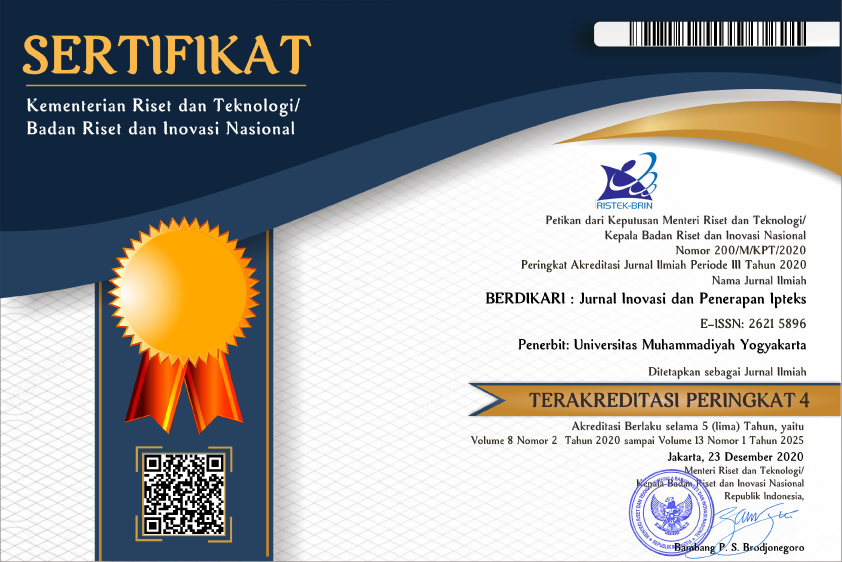Digital Marketing Produk Usaha Mikro, Kecil, dan Menengah Lurik Mozaik
DOI:
https://doi.org/10.18196/berdikari.v10i1.13379Keywords:
pandemic, marketing, knowledge, repackagingAbstract
During COVID-19, the micro, small and medium enterprise (MSME) sector was the most affected. Many MSMEs went out of business due to failing to adapt to these conditions. MSME Batik Lurik Mozaik Sumberadi Sleman Yogyakarta is one of the MSMEs affected and needs digital marketing assistance in marketing. This service method is carried out through several stages. The preparation stage was conducted through observations, interviews, and focus group discussions (FGD) to get an initial assessment. After that, the implementation, monitoring and feedback stages were also held. This service program has succeeded in increasing the knowledge of Lurik Mozaik MSME managers regarding digital marketing and repackaging by 85%. The implication is that MSME Batik Lurik Mozaik Sumberadi Sleman can expand its marketing network and focus on developing digital-based marketing quality.
References
Agustin, C. A., & Hellianto, G. R. (2020). Pengaruh Reputasi Terhadap Minat Beli Produk Skincare di Shopee. Business Economic, Communication, and Social Sciences (BECOSS) Journal, 2(1), 39-52.
https://journal.binus.ac.id/index.php/BECOSS/article/view/6050
Faris, M. I., Sembodo, G., Hasanah, L. U., & Pramono, A. (2018). Pelatihan Sukses Berbisnis Online Memajukan Perekonomian Masyarakat Melalui Pemasaran Online Putat Jaya Surabaya. Jurnal Abdikarya: Jurnal Karya Pengabdian Dosen dan Mahasiswa, 1(1), 86-89. http://jurnal.untag-sby.ac.id/index.php/abdikarya/article/view/2041
Febriyantoro, M. T., & Arisandi, D. (2018, Desember). Pemanfaatan Digital Marketing Bagi Usaha Mikro, Kecil dan Menengah Pada Era Masyarakat Ekonomi Asean. Jurnal Manajemen Dewantara, 1(2), 62-76.
He, H., & Harris, L. (2020). The impact of COVID-19 Pandemic on corporate social responsibility and pemasaran philosophy. Journal of Business Research, 116(May), 176–182. https://doi.org/10.1016/j.jbusres.2020.05.030
Herhausen, D., Miočević, D., Morgan, R. E., Kleijnen, M. H. P., Luminy, D. De, & Antoine, R. (2020). The pemasaran digital capabilities gap. Industrial Pemasaran Management, 90(March), 276–290. https://doi.org/10.1016/j.indmarman.2020.07.022
Herman. (2020, Juni 8). 2.322 Koperasi dan 185.184 UMKM Terdampak Covid-19. Dipetik Oktober 2020, dari Berita Satu: https://www.beritasatu.com/ekonomi/642537/2322-koperasi-dan-185184-umkm-terdampak-covid19
Luc, M. H., Tsang, S. W., Thrul, J., Kennedy, R. D., & Moran, M. B. (2020). Content analysis of online product descriptions from cannabis retailers in six US states. International Journal of Drug Policy, 75, 102593. https://doi.org/10.1016/j.drugpo.2019.10.017
Nurjanah, A., & Widodo, A. S. (2020). Pendampingan Pengelolaan Sampah Mandiri di Padukuhan Kalak Ijo, Guwosari, Panjatan, Bantul. WEBINAR ABDIMAS 3, 80–86. Yogyakarta: LP3M UMY. Retrieved from https://prosiding.umy.ac.id/semnasppm/index.php/psppm/article/view/141/70
Korten, D. C. (2002). Menuju Abad Ke-21; Tindakan Sukarela dan Agenda Global. Jakarta: Yayasan Pustaka Obor Indonesia.
Koperasi&UKM, K. (2021, Desember 4). Kementrian Koperasi dan UKM. Dipetik Desember 2021, dari Kemenkopukm: https://www.kemenkopukm.go.id/read/menteri-teten-masduki-pemerintah-serius-dorong-umkm-naik-kelas
Rahman, F., & Mawardi, M. K. (2017). Strategi UMKM dalam membangun brand toko online di marketplace (Studi pada komunitas tokopedia di Kota Bekasi). Jurnal Administrasi Bisnis, 53(1), 39-48. http://administrasibisnis.studentjournal.ub.ac.id/index.php/jab/article/view/2180
Singgih, M. N. (2007, Oktober 3). Strategi Penguatan Usaha Mikro Kecil Menengah (Umkm) Sebagai Refleksi Pembelajaran Krisis Ekonomi Indonesia. Jurnal Ekonomi MODERNISASI, 3(3), 218-227.
Smith, K. T. (2003). The Marketing Mix Of Imc: A Move From The 4 P’s To The 4c’s. Journal of Integrated Marketing Communicatons, 1–3.
Sugiyanto, S. P. (2020). Nilai Positif Pandemi Covid-19 Bagi UMKM: Studi Kasus Di Kota Yogyakarta. APMD Development Community, 1-20.
Downloads
Published
Issue
Section
License
Copyright
Authors retain copyright and grant BERDIKARI Jurnal Inovasi dan Penerapan IPTEK the right of first publication with the work simultaneously licensed under an Attribution 4.0 International (CC BY 4.0) that allows others to remix, adapt and build upon the work with an acknowledgment of the work's authorship and of the initial publication in BERDIKARI Jurnal Inovasi dan Penerapan IPTEK.
Authors are permitted to copy and redistribute the journal's published version of the work (e.g., post it to an institutional repository or publish it in a book), with an acknowledgment of its initial publication in BERDIKARI Jurnal Inovasi dan Penerapan IPTEK
License
Articles published in the BERDIKARI Jurnal Inovasi dan Penerapan IPTEK) are licensed under an Attribution 4.0 International (CC BY 4.0) license. You are free to:
- Share — copy and redistribute the material in any medium or format.
- Adapt — remix, transform, and build upon the material for any purpose, even commercially.
This license is acceptable for Free Cultural Works. The licensor cannot revoke these freedoms as long as you follow the license terms. Under the following terms:
- Attribution — You must give appropriate credit, provide a link to the license, and indicate if changes were made. You may do so in any reasonable manner, but not in any way that suggests the licensor endorses you or your use.
- No additional restrictions — You may not apply legal terms or technological measures that legally restrict others from doing anything the license permits.




